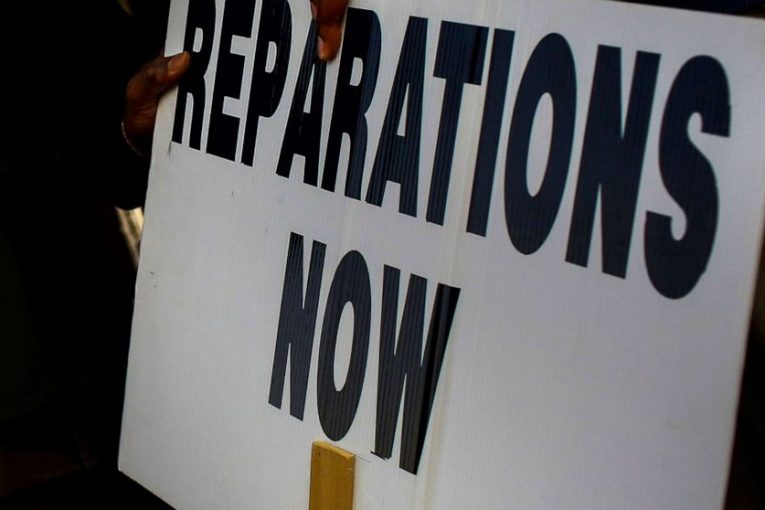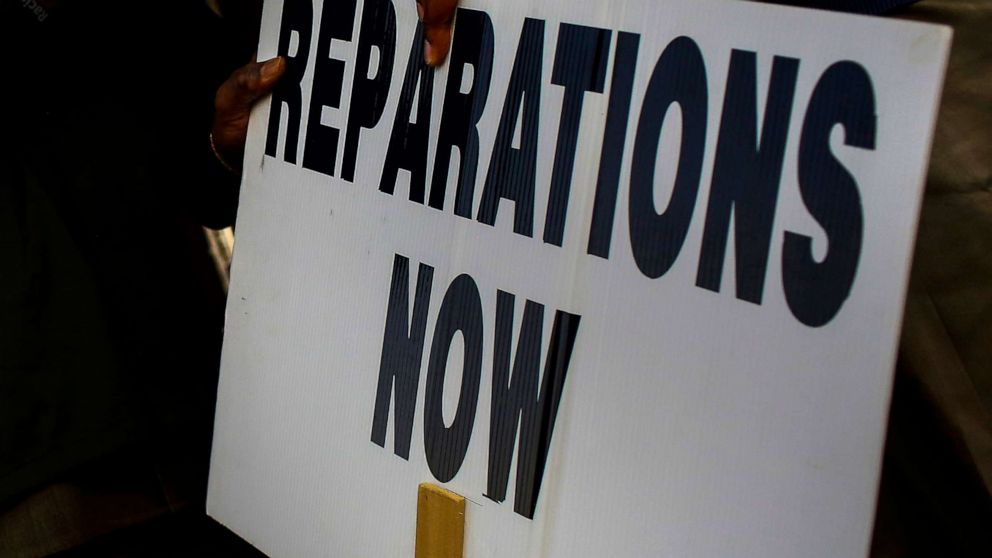

by Robert J. Hansen
The California Reparations Task Force, the first initiative of its kind by a state government, released its final report and recommendations Thursday.
The Task Force’s final report identified methodologies for calculating reparations payments to eligible Black Californians and recommended numerous policy changes directed at redressing every aspect of the atrocities perpetrated against African Americans.
Task force Chair Kamilah Moore told the Sacramento Bee she feels “pretty confident” in the work that the task force has put forth, which gives lawmakers a road map to provide monetary compensation.
“I think there are already some elected officials who have openly stated that they are inspired by the work that we’ve done and are looking forward to introducing legislation,” Moore told the Bee. “I think as early as later this year, no later than 2024, we might see some reparations legislation.”
The institution of slavery is inextricably woven into the establishment, history, and prosperity of the United States. Constitutionally and statutorily sanctioned from 1619 to 1865, slavery deprived more than four million Africans and their descendants of life, liberty, citizenship, cultural heritage, and economic opportunity.
Following the abolition of slavery, government entities at the federal, state, and local levels continued to perpetuate, condone, and often profit from practices that brutalized African Americans and excluded them from meaningful participation in society.
Attorney General Rob Bonta said California must start with accountability if it wants to be a leader in the movement for true reparatory justice for African Americans.
“Our nation has for too long overlooked the atrocities visited upon African Americans or consigned them to vestiges of the past,” AG Bonta said. “This final report decisively establishes that now is the time for California to acknowledge the state’s role in perpetuating these harms, and ensure that through a comprehensive approach to reparations, we commit ourselves to the healing and restoration of our African American residents.”
The legacy of slavery and racial discrimination has resulted in debilitating economic, educational, and health hardships that are uniquely experienced by African Americans.
Taking steps to dismantle systemic racism will take courage some in the party have yet to show, Senator Steven Bradford told Politico.
“This country was built on white supremacy as a whole,” Bradford said. “I think racism is a bigger factor than party, because we have Democratic majorities in both houses, and we still struggle to move these progressive, liberal bills.”
Although California technically entered the Union in 1850 as a free state, ts early state government supported slavery.
Some scholars estimate that up to 1,500 enslaved African Americans lived in California in 1852. Enslaved people trafficked to California often worked under dangerous conditions, lived in unclean environments, and faced brutal violence.
California did not ratify the Fourteenth Amendment, which protected the equal rights of all citizens, until 1959 and did not ratify the Fifteenth Amendment, which prohibited states from denying a person’s right to vote based on race, until 1962.
Several California cities did not hire African American workers until the 1940s. Today, by some measures, two of California’s major industries, Hollywood and Silicon Valley, employ disproportionately fewer African Americans.
A 2014 study of the Los Angeles metro area found that the median value of liquid assets for native-born African American households was $200, compared to $10.000 for white households.
According to the International Commission of Jurists, (ICJ) compensation is to be understood “as the specific form of reparation seeking to provide economic or monetary awards for certain losses, be they of material or immaterial, of pecuniary or non-pecuniary nature.”
The California Department of Justice (DOJ) warned of recent electronic communications and social media posts sharing false and misleading information about African American California residents receiving monetary reparations. This information is false.
“There is no such process in place with the Department of Justice or any other state agency,” the DOJ said.







I find it amusing that those who aren’t white would (also) be forced into paying reparations. Including Asians, Hispanics, Native Americans, black people, etc.
I suspect that if this type of thing actually goes anywhere, it may push the state back toward Republican representatives. Sort of the “straw that broke the camel’s back”, so to speak.
Keep in mind that this is a state which recently-rejected Affirmative Action, and has recently had Republican governors.
The legislature, attorney general, and governor are increasingly out-of-touch with their own constituents. The only reason that this has occurred is because the process itself limits the choices and thereby controls the outcome.
To paraphrase George Carlin: You have no (actual) choice. It’s an illusion.
I find it amusing that Germany paid billions for the holocaust but US never reimbursed the freed slaves nor the families of the freed slaves.
None of that is “amusing”. Don’t know about the situation with Germany, but presumably it occurred within a reasonable timeframe.
Did Japan also pay reparations (e.g., to China)? Did Russia, in regard to the atrocities they committed during their occupation of Germany?
Do you suppose Russia will do so in regard to Ukraine?
The only reparations I’m aware of (in regard to the U.S.) are those paid to Japanese internment camp survivors. (Again, within a reasonable timeframe). And again, related to a war.
But I doubt that those who have experienced discrimination themselves are going to find it amusing, either. Including members of all of the groups I listed, who would now have to pay.
I agree it “should have” happened, some 150 years ago – when former slaves were still alive. Then again, slavery shouldn’t have happened in the first place.
You talk about the government as if they have their “own” money. They don’t – they get it from the groups listed above.
Instead of remedying slavery, we reinslaved people through convict leasing and Jim Crow.
The reparations are supposedly related to slavery (outside of California, for that matter), not Jim Crow or “convict leasing” – whatever that means.
But again, my comment is more of an observation, not an argument. And I suspect that if you ask the “average immigrant family” (e.g., anyone who arrived in this country after slavery ended, or whose ancestors did so) if they’re “fond” of this idea, you’ll get a resounding “no”.
Or, from black people who don’t “qualify” – regardless of whether or not their ancestors were in this country during the time of slavery.
Probably from Native American groups, as well (unless they get their “own” reparations) – though an argument might be made that they’ve already received it (see reservations, Native American casino monopoly, etc.).
I’m sure you’re aware of the Chinese exclusion act, etc. And a whole host of other things that have occurred.
I’m sure just about every group (including some “white” people) can find something that occurred to their ancestors for which they believe they’re personally “owed”.
For that matter, that’s probably why some of them came to this country – some “unfair” situation in their native countries. Of course, those stories have largely been lost to time.
This is the part I find amusing. That is, non-white people forced to pay reparations to other non-white people, to account for “white supremacy”.
Then again, a former school board member in San Francisco claimed that Asians were using “white supremacy” to get ahead. And in a sense, she may have had a point.
Sounds like “white supremacy” is a benefit (or skill?) that everyone should seek, regardless of skin color. I’m pretty sure that there’s vast numbers of white people who don’t have it. (For sure, actual “white supremacists” don’t have it.)
But definitely “disavow” it, when the government subsequently wants to take your money to account for white supremacy – including from non-white groups who are apparently “borrowing it” to get ahead. That’s when you want to have nothing to do with white supremacy.
“This is the part I find amusing. That is, non-white people forced to pay reparations to other non-white people, to account for “white supremacy”.”
It’s not like it’s direct person to person payments.
That’s what they’re counting on, to make this “fly”. It seems that a lot of people never think about “where” government money comes from.
The government has no money themselves. All they can ultimately do is to take from one group (or groups), and give it to another group.
Though they can “print money”, which has a whole host of consequences. (Of course, California can’t do this.)
Maybe they can pay them using “Confederate” money? That would be “justice”, right?
I suppose it’s too late to actually track down where all of the ” monetary value” created by slavery ended up. Especially since a lot of it was destroyed during the civil war.
Actually, now that I think about it – I guess the U.S. government “paid” the south for some of the damage it inflicted, during the subsequent reconstruction. Though I don’t know much about that.
I suspect that there were a lot of “innocent people” (e.g., “good people on both sides” – someone might say) who suffered during that war.
Also important to note, this is just a report with recommendations, not legislation.
Yeah – I suspect it will never get beyond “government virtue signaling”. For one thing, both Newsom and Bonta seem to have ambitions beyond their current positions, and this would likely be a political death knell for them. (Again, this is more of an observation, than an “argument”.)
Some may look at this even more-cynically, in that some politicians are trying to have it “both ways” (e.g., “entertaining” the proposals, but with no actual intent to act upon them).
In a sense, I have more respect for politicians who would actually act upon it. And there are clearly some who would do so.